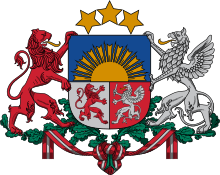Latvian citizenship
| Latvian Citizenship Act | |
|---|---|
 |
|
| Parliament of Latvia | |
| An Act relating to Latvian citizenship | |
| Enacted by | Government of Latvia |
| Status: Current legislation | |
The Latvian nationality law (Latvian: Pilsonības likums) is based on the Citizenship Law of 1994 (as at 2013, amended four times, most recently through the amendments approved by the Parliament of Latvia on May 9, 2013). It is primarily based on jus sanguinis.
The first nationality law of Latvia was adopted in August, 1919. In September, 1940, the Supreme Soviet of the Soviet Union adopted a decree on the order of receiving USSR citizenship by the citizens of the Latvian, Lithuanian and Estonian SSRs. In October, 1991, the Supreme Council of the Republic of Latvia has adopted a resolution "On the renewal of Republic of Latvia citizens' rights and fundamental principles of naturalization" declaring the 1940 decree null and void with regard to Republic of Latvia citizens. On 2 September 2012, the Central Election Commission received a draft for amendments to the Citizenship Law, providing that, from 1 January 2014, all non-citizens (a status held by former USSR citizens who do not possess citizenship of Latvia or any other state and who do not apply for citizenship while residing in Latvia), who by 30 November 2013 had not applied, under the rules of the Cabinet of Ministers, to retain the status of non-citizen shall be considered to be citizens of Latvia; these amendments would have automatically granted citizenship to any person who might have the status of non-citizen, without regard for place of residence, interest in acquiring citizenship of Latvia, and awareness of the amendments. The Central Election Commission sought opinions from legal experts before itself making any decision on the admissibility and sufficiency of the popular initiative. The majority of the experts requested were inclined to consider there to have been sound arguments for ceasing organisation of the popular initiative, the Central Election Commission went along with their opinion.
Dual citizenship is not prohibited by Latvian citizenship law. According to the amendments to the Citizenship Law which came into force on 1 October 2013, citizenship of Latvia may be retained for persons who have acquired:
Citizenship of another EU Member State or another EFTA Member State;
Citizenship of another NATO Member State
Citizenship of Australia, Brazil or New Zealand;
Citizenship of such a country with which Latvia has concluded an agreement on the recognition of dual citizenship (no such agreement is currently concluded);
Citizenship of a country not referred to previously if due to important national interests permission from the Government of Latvia is received to retain dual citizenship;
Citizenship of a country not referred to previously if it has been acquired automatically (ex lege), through marriage or as a result of adoption.
Children of citizens of Latvia may hold dual citizenship with any country. Some countries, such as Japan, however, do not permit their nationals to also, after reaching adulthood, hold a foreign citizenship. A dual Latvian-Japanese national must declare, to Japan's Ministry of Justice, his or her intention as to which citizenship to keep, before turning 22.
...
Wikipedia
